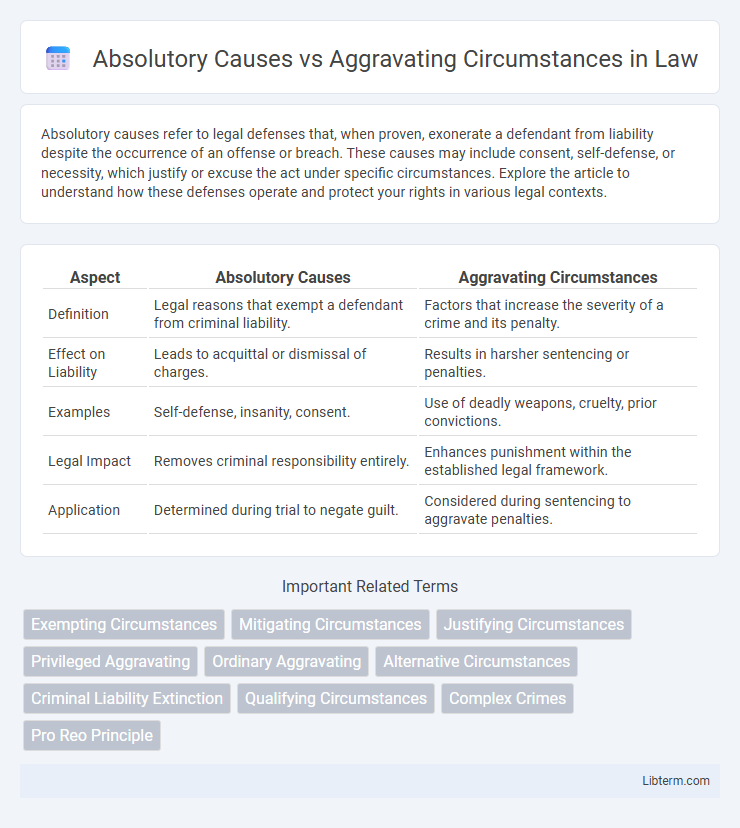Absolutory causes refer to legal defenses that, when proven, exonerate a defendant from liability despite the occurrence of an offense or breach. These causes may include consent, self-defense, or necessity, which justify or excuse the act under specific circumstances. Explore the article to understand how these defenses operate and protect your rights in various legal contexts.
Table of Comparison
| Aspect | Absolutory Causes | Aggravating Circumstances |
|---|---|---|
| Definition | Legal reasons that exempt a defendant from criminal liability. | Factors that increase the severity of a crime and its penalty. |
| Effect on Liability | Leads to acquittal or dismissal of charges. | Results in harsher sentencing or penalties. |
| Examples | Self-defense, insanity, consent. | Use of deadly weapons, cruelty, prior convictions. |
| Legal Impact | Removes criminal responsibility entirely. | Enhances punishment within the established legal framework. |
| Application | Determined during trial to negate guilt. | Considered during sentencing to aggravate penalties. |
Introduction to Absolutory Causes and Aggravating Circumstances
Absolutory causes refer to specific legal reasons that completely exempt a person from criminal liability despite the commission of an act, such as self-defense or lack of criminal intent. Aggravating circumstances, on the other hand, are factors that increase the severity or culpability of a crime, leading to heavier penalties or sentences. Understanding the distinction between these legal concepts is crucial for accurately assessing criminal responsibility and appropriate judicial outcomes.
Defining Absolutory Causes in Criminal Law
Absolutory causes in criminal law refer to specific legal conditions or defenses that exempt a defendant from criminal liability despite the commission of an act that would otherwise constitute a crime. These causes include self-defense, necessity, and insanity, which negate the unlawfulness or culpability of the act, thereby absolving the accused from punishment. Understanding absolutory causes is essential for distinguishing acts that are justified or excused from those that warrant penal consequences.
Key Examples of Absolutory Causes
Key examples of absolutory causes include self-defense, where the act is justified by the need to prevent imminent harm; involuntary intoxication, which impairs intent; and necessity, involving actions taken to prevent greater harm under urgent conditions. These causes exempt the accused from criminal liability by negating wrongful intent or unlawfulness. Unlike aggravating circumstances that increase penalties, absolutory causes serve as full defenses leading to acquittal.
Understanding Aggravating Circumstances
Aggravating circumstances refer to specific factors or conditions that increase the severity or culpability of a criminal act, leading to harsher penalties under the law. These circumstances include premeditation, cruelty, use of deadly weapons, or committing a crime against vulnerable victims, which courts recognize to justify enhanced sentencing. Understanding aggravating circumstances is crucial for legal professionals as they directly influence the degree of punishment and the judicial discretion in criminal cases.
Types of Aggravating Circumstances
Aggravating circumstances are specific factors that increase the severity or culpability of a criminal act, such as recidivism, use of a deadly weapon, or committing the offense in the presence of minors. These circumstances contrast with absolutory causes, which serve as legal defenses that exempt a person from criminal liability, like self-defense or insanity. Understanding the types of aggravating circumstances aids in determining enhanced penalties under criminal law, significantly impacting sentencing outcomes.
Similarities between Absolutory Causes and Aggravating Circumstances
Absolutory causes and aggravating circumstances both influence the judicial assessment of criminal cases by affecting the outcome and severity of penalties. They serve as legal considerations that modify the defendant's liability, either by exempting them from punishment in the case of absolutory causes or by increasing the severity of sentencing under aggravating circumstances. Both require careful factual and legal evaluation to ensure just application within the criminal justice system.
Key Differences: Absolutory Causes vs Aggravating Circumstances
Absolutory causes refer to legal reasons that excuse a defendant from criminal liability, such as self-defense or duress, effectively absolving them of guilt. Aggravating circumstances, on the other hand, are factors that increase the severity or culpability of a crime, leading to harsher penalties, like the use of a deadly weapon or committing a crime with previous convictions. The key difference lies in that absolutory causes negate liability entirely, while aggravating circumstances enhance the punishment imposed.
Legal Implications and Effects in Sentencing
Absolutory causes, such as self-defense or insanity, completely exempt a defendant from criminal liability, resulting in acquittal or dismissal of charges. In contrast, aggravating circumstances, like prior convictions or use of a deadly weapon, do not absolve guilt but increase the severity of the sentence by enhancing penalties or extending imprisonment terms. Courts weigh these factors carefully, as absolutory causes negate culpability while aggravating circumstances intensify legal consequences, directly influencing sentencing outcomes.
Jurisprudence and Landmark Cases
Absolutory causes refer to legal provisions that exempt an accused from criminal liability despite proof of the crime, as illustrated in landmark cases such as People v. Sandiganbayan, where mental incapacity was deemed an absolutory cause. Aggravating circumstances increase the severity of the penalty imposed and are exemplified in cases like People v. Ibanez, where the presence of multiple offenders was considered an aggravating factor. Jurisprudence consistently emphasizes the distinction, ensuring that absolutory causes nullify criminal liability while aggravating circumstances only enhance punishment without negating guilt.
Conclusion: Importance in Criminal Justice System
Absolutory causes serve as legal defenses that exonerate the accused, while aggravating circumstances increase the severity of the offense, leading to harsher penalties. Understanding the distinction is crucial for fair adjudication, ensuring justice balances between leniency and deterrence. This clarity promotes accurate sentencing, upholds legal integrity, and reinforces public trust in the criminal justice system.
Absolutory Causes Infographic

 libterm.com
libterm.com